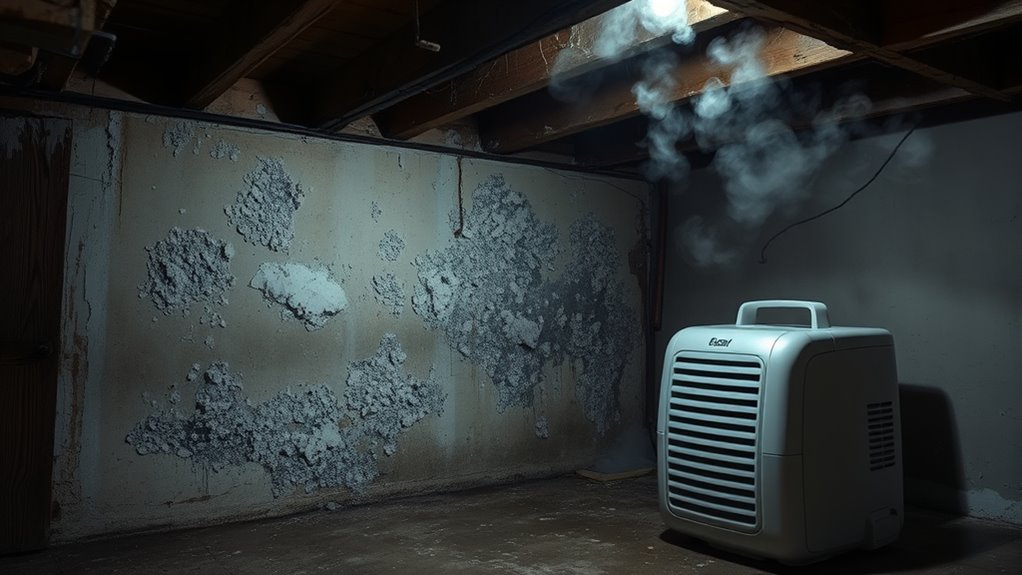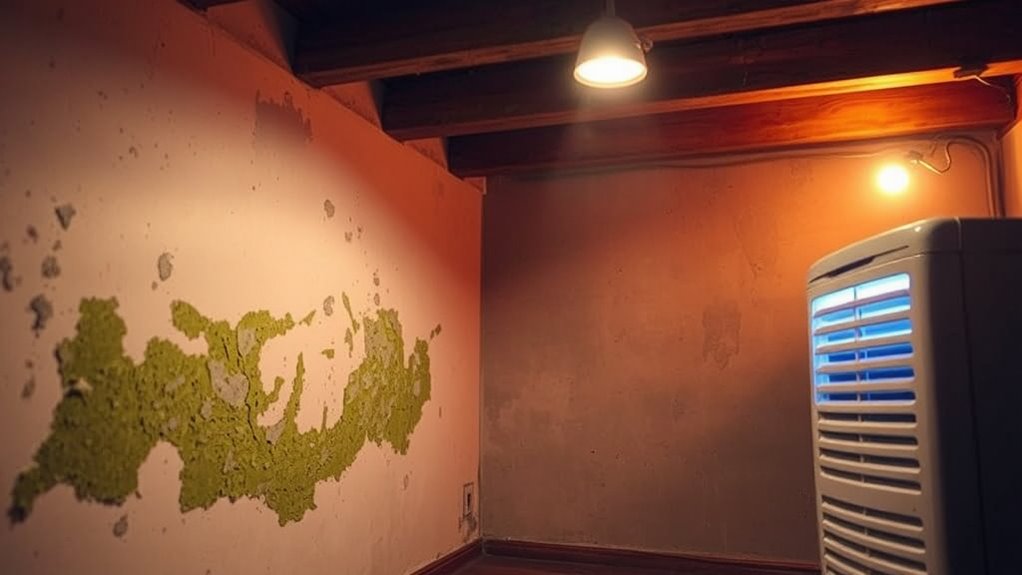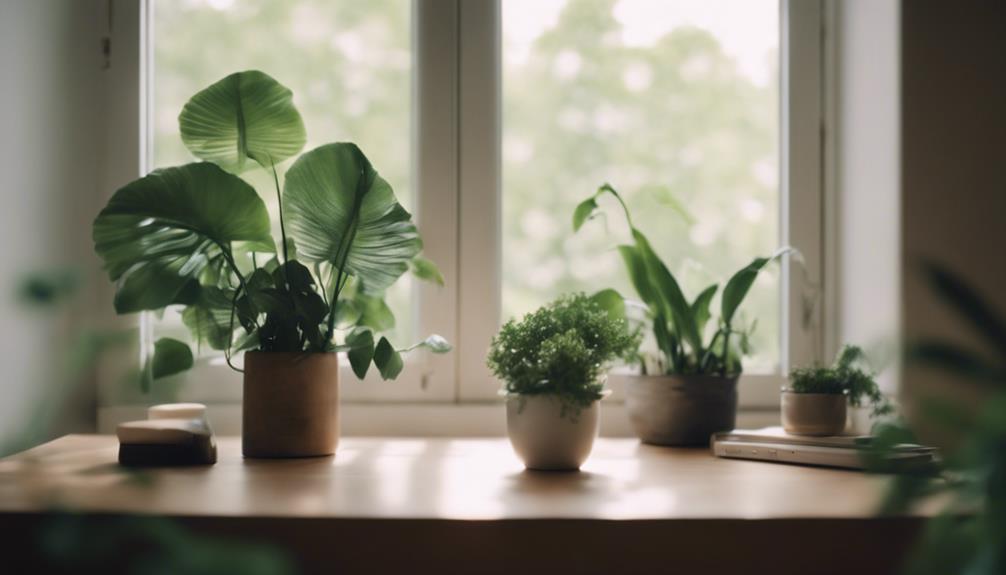Musty house odors come from mold and mildew growth caused by excess moisture and poor air circulation. When humidity levels stay high, mold spores land on damp surfaces and release VOCs that produce that musty smell. To fix this, control humidity with dehumidifiers, guarantee good ventilation, and fix leaks promptly. By understanding how moisture fuels mold, you can eliminate odors permanently—discover more tips to keep your home fresh and mold-free.
Key Takeaways
- Musty odors originate from mold and mildew releasing VOCs in damp, poorly ventilated areas.
- Controlling indoor humidity to 30-50% prevents mold growth and associated smells.
- Moisture from leaks or water damage creates ideal conditions for mold spores to thrive.
- Proper ventilation, drying, and cleaning inhibit mold development and eliminate existing odors.
- Regular home maintenance and moisture management are essential for permanent odor prevention.

Musty house smells often stem from the growth of mold and mildew, which thrive in damp, poorly ventilated areas. When moisture accumulates inside your home, it creates the perfect environment for these fungi to flourish. Mold growth begins when tiny spores land on surfaces with enough moisture to sprout and spread. Once established, mold releases volatile organic compounds (VOCs) that produce that characteristic musty odor you’re trying to eliminate. To combat this, controlling humidity levels is essential. Maintaining indoor humidity between 30% and 50% prevents mold spores from settling and growing. Using a dehumidifier or air conditioner can help keep moisture in check, especially during humid seasons or in damp areas like basements and bathrooms. Good ventilation is equally important. Opening windows, installing exhaust fans, or using air purifiers with HEPA filters reduces moisture buildup and removes airborne mold spores, limiting their chance to settle and grow. Additionally, moisture control techniques are critical in preventing mold development and eliminating odors effectively. Proper ventilation practices help maintain a dry environment that discourages mold spores from settling on surfaces. You might also notice that moisture lingering after a leak or flooding can lead to persistent odors. It’s not just the visible mold you need to worry about; hidden mold behind walls or under flooring can silently produce smells. That’s why thorough drying and cleaning are vital after any water intrusion. Using fans and dehumidifiers to thoroughly dry out affected areas prevents mold growth before it begins. When cleaning, opt for mold-killing solutions like diluted bleach or commercial mold removers, and scrub surfaces thoroughly. Regular inspections and early detection of water damage are essential to prevent mold from taking hold and causing odors. In addition, maintaining proper air circulation throughout your home can significantly reduce dampness and mold risk. Don’t forget to wash fabrics, curtains, and upholstery that might harbor mold spores as well.
Controlling humidity and moisture isn’t just about eliminating existing mold; it’s about preventing future growth. Regularly inspecting your home for leaks, condensation, or any signs of water damage helps catch problems early. Fixing leaks in pipes, roofs, or windows stops excess moisture from seeping into your home’s structure. You should also consider insulating pipes and windows to reduce condensation, which can contribute to dampness. Remember, a well-ventilated, dry environment discourages mold growth and keeps your home smelling fresh. Addressing the root causes of moisture and humidity issues is the most effective way to eliminate that musty smell permanently. If you find persistent odors despite these efforts, it may be time to consult a professional mold remediation specialist to thoroughly assess and treat hidden mold colonies. Keeping humidity under control and moisture out of your home creates an inhospitable environment for mold, ensuring your living space stays clean, healthy, and free of that unpleasant musty scent. Additionally, understanding the role of color accuracy in home cinema projectors can help ensure your environment remains comfortable and visually appealing, free from color distortions that could be mistaken for mold or dampness.
Frequently Asked Questions
Can Indoor Plants Help Reduce Musty Odors?
Indoor plants can help reduce musty odors through their natural plant benefits, especially odor absorption. As you place plants like peace lilies or snake plants in your home, they absorb airborne toxins and moisture that contribute to musty smells. This not only freshens the air but also creates a healthier environment. Remember, regular maintenance and proper plant choice enhance odor absorption, making your space smell cleaner and more inviting.
Do Air Purifiers Effectively Eliminate Musty Smells?
Imagine your home’s air as a tangled web of smells, where musty odors cling like stubborn shadows. An air purifier can be a knight’s armor, fighting odor molecules with HEPA filters and activated carbon. While air purifier effectiveness varies, it often helps reduce musty smells when paired with odor elimination techniques. Keep your space fresh by regularly changing filters and ventilating, letting your home breathe freely again.
How Long Does It Take to Remove Persistent Musty Odors?
It typically takes several days to weeks to remove persistent musty odors, depending on the source and severity. Your efforts in odor absorption and scent neutralization speed up this process. You can use air purifiers, deep cleaning, and ventilation to absorb odors and neutralize scents effectively. Consistently addressing the source and using proper techniques will shorten the time it takes to eliminate the smell completely.
Are Certain Building Materials More Prone to Mustiness?
Think of your home as a garden; some plants thrive, while others struggle with dampness. Certain building materials, especially those with low moisture resistance like particleboard or untreated wood, are more prone to mustiness. These materials absorb moisture easily, creating a perfect environment for mold and mildew. To keep your home fresh, choose moisture-resistant options like sealed concrete or treated lumber, preventing musty odors from taking root.
Does Humidity Level Directly Correlate With Musty Odor Intensity?
You might wonder if humidity level directly affects how strong a musty odor seems. The answer is yes—higher humidity can increase odor absorption, making musty smells more noticeable. By controlling humidity, you reduce mold growth and dampness, which are major odor sources. Proper humidity control keeps the air drier, helping prevent odor absorption and maintaining a fresher, cleaner-smelling home overall.
Conclusion
Now that you understand what causes that stubborn musty odor, you can take action to eliminate it for good. Remember, addressing moisture issues, improving ventilation, and using proper cleaning methods are key steps. Isn’t it worth creating a fresh, inviting space you’ll love coming home to? With a little effort, you can banish that musty smell forever and enjoy a cleaner, healthier house today. Why settle for less when a fresher home is within your reach?
Amina brings over a decade of journalism experience to her role as Editor-in-Chief. Under her leadership, Exquisite Post has flourished, maintaining the highest standards of integrity and excellence. Amina’s commitment to truth and her visionary approach guide the editorial team in producing impactful news stories that resonate with our audience.










